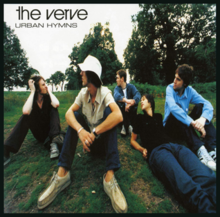Urban Hymns
| Urban Hymns | ||||
|---|---|---|---|---|
 |
||||
| Studio album by The Verve | ||||
| Released | 29 September 1997 | |||
| Recorded | October 1996 – May 1997 | |||
| Studio | Olympic Studios, London | |||
| Genre | Britpop | |||
| Length | 75:51 | |||
| Label | Hut | |||
| Producer |
|
|||
| The Verve chronology | ||||
|
||||
| Singles from Urban Hymns | ||||
|
||||
| Professional ratings | |
|---|---|
| Review scores | |
| Source | Rating |
| AllMusic | |
| Entertainment Weekly | B+ |
| The Guardian | |
| Los Angeles Times | |
| NME | 8/10 |
| Pitchfork Media | 8.9/10 |
| Q | |
| Rolling Stone | |
| The Rolling Stone Album Guide | |
| Select | 5/5 |
Urban Hymns is the third studio album by English alternative rock band The Verve, released on 29 September 1997 on Hut Records. It earned nearly unanimous critical praise upon its release, and went on to become the band's best-selling release and one of the biggest selling albums of the year. As of 2015, Urban Hymns is ranked the 18th best-selling album in UK chart history and has sold over ten million copies worldwide.
The album features the hit singles "Bitter Sweet Symphony", "Lucky Man" and "The Drugs Don't Work". The critical and commercial success of the album saw the band win two Brit Awards in 1998, including Best British Group, and appear on the cover of Rolling Stone magazine in March 1999. "Bitter Sweet Symphony" was nominated for the Grammy Award for Best Rock Song.
The Verve had previously released two albums, A Storm in Heaven in 1993 and A Northern Soul in 1995. The band had only achieved moderate commercial success up to that point, and the band split shortly after their second album due to internal conflicts. Vocalist Richard Ashcroft quickly reformed the group, with Simon Tong, an old friend of the band on guitar, however Ashcroft realised Nick McCabe's unique guitar style was required to complete the true Verve unit and later asked him to return. Tong also remained adding more guitar and keyboard/organ textures, making them a five-piece band and expanding their sound.
The four-piece had already recorded several tracks for the album with Youth as producer, but once McCabe returned they re-recorded several tracks and changed producers to Chris Potter. McCabe said that in the next seven months of work, "... the key tracks were recorded from scratch, but some of them were already there."
...
Wikipedia
